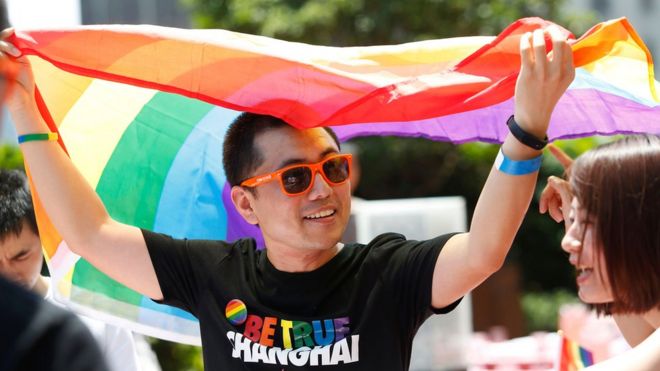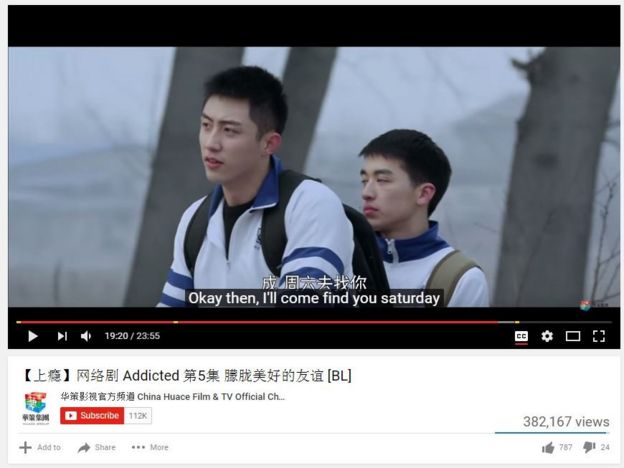A crackdown on a wide range of internet videos by Chinese censors has caused a backlash on the country's popular micro-blogging site Sina Weibo, with many users objecting to a decision to ban content which features same-sex relationships.
On Chinese social media, many were left angry, baffled, and upset:
"Aren't people born equal? ... What right do you have to discriminate against others?" said one. Another commented: "Aren't homosexuals normal? Why do you push them to a corner?"
The outcry was prompted a decision by Beijing regulators to censor the portrayal of homosexual activity in online videos. The regulations, which came into force at the beginning of July, classify homosexuality as "abnormal" sexual behaviour and cover not only explicit sexual content but any portrayal of same-sex relationships, positive or negative - for instance in popular online dramas.
On Weibo, the hashtag "Online Content Review Discriminating [Against] Gays" was viewed by millions and generated thousands of comments. And while the decision sparked the biggest backlash from Chinese social media users, the censorship extends further.
There are 84 categories of material that were banned from online video programmes by Chinese censors, including prostitution, drug addiction, extra-marital affairs and what authorities deem to be "unhealthy" views of the family, relationships and money. A ban on the portrayal of "erotic behaviour" includes kisses which last for a long time.
The guidance stipulates that all online content should help "realize the China dream of a great rejuvenation of the Chinese nation."
The reality in China'
One prominent voice who has criticised Chinese government censorship is Li Yinhe, China's first female sexologist and a well-known commentator on LGBT (lesbian, gay, bisexual and transgender) issues.
"To [the government], homosexuality is regarded as obscene," she says, adding that the LGBT community is "very angry."
Li Yinhe tells BBC Trending radio that when she recently wrote a piece calling on the government to end the censorship mechanism entirely, the article was taken down by Weibo censors just a few hours after publication.
"Well, this is the reality in China," she says.
Beijing's 'snobbish' dating scene mocked
LISTEN: on BBC Trending radio
Visit BBC Trending on Facebook
Listen: China's rush for divorce
Under the latest guidelines, which were issued by the China Netcasting Services Association, at least two to three "auditors" will have to check all online content to make sure it adheres to the "advanced culture of socialism."
The latest regulations are part of a wide campaign by the authorities to control discourse online through the censorship of a wide range of content including live streaming, news and social media.
Just over a year ago Beijing issued a set of regulations which banned the portrayal of homosexuality on television as part of what they described as being a cultural crackdown on "vulgar, immoral and unhealthy content."
A number of Chinese gay dating apps have also been shut down in the country - the most recent example being the lesbian dating app Rela which had more than five million users and was shut down at the end of May this year.
'Like Big Brother'
Homosexuality is not illegal in China, and was removed from an official list of mental disorders in 2001.
Tim Hildebrandt, an assistant professor of social policy and development at the London School of Economics, says the recent censorship around homosexuality is surprising.
"Social acceptance of homosexuality had really gone up in China over the last five to 15 years," he says. "Unlike a lot of places with institutionalised religion, it's not a place that has ever viewed homosexuality as inherently sinful. It's been viewed over time as an oddity, but not an inherent threat to society. The only threat it served was as one of non-conformity to a perfect model of the family."
Hildebrandt adds that the latest guidelines issued around homosexual content online are "particularly worrisome."
"Some might assume this is just about pornography," he says. "This is not really the case. It's any portrayal of homosexuality in online videos. As to what that means for gay people in China, essentially the internet is one of the few safe spaces to meet others within the community. This is how people are meeting each other both in a platonic and romantic setting."
Wenxiong, a gay Chinese man who is currently studying in the US, says that the homosexuality ban online feels "like the Cultural Revolution again."
"We are seeing a group of people as a target of antagonism and people can say bad things about them, or insult them," he says.
"The government, aside from the regulations on LGBT content, is also issuing a lot of other cultural tightening regulations," he says. "It's like Big Brother is watching you now. The government is telling you that you cannot have a gay life."
source: bbc news trending
source: bbc news trending



Comments
Post a Comment